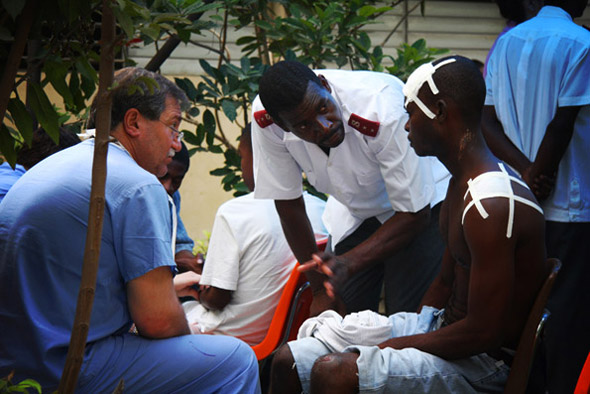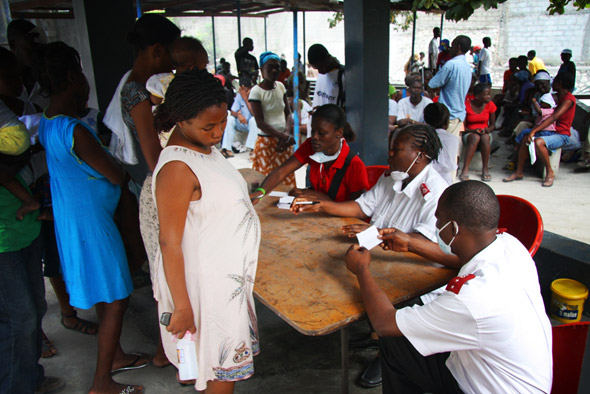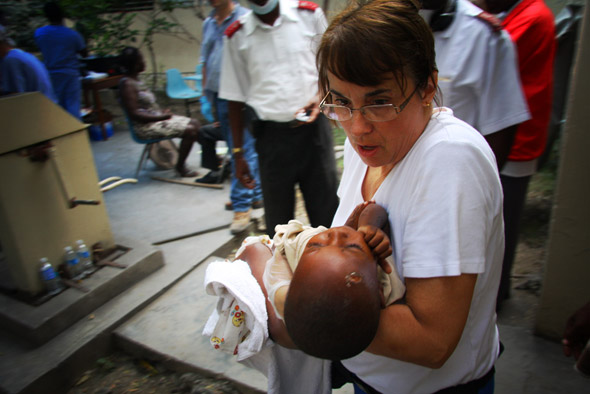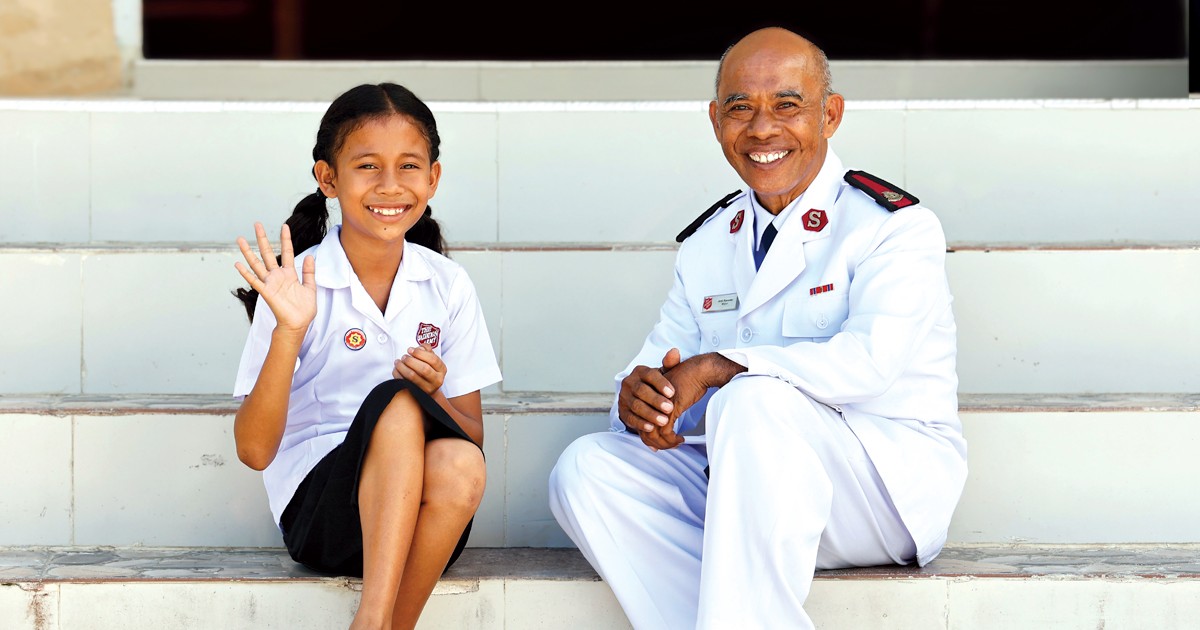 The Salvation Army in Canada & Bermuda continues to serve the victims in Haiti as a part of its disaster response plan. In cooperation with Salvation Army teams from the United States and the United Kingdom, 7,000 Haitians were given a five-day supply of food on Monday and hundreds more, including infants and orphans received medical care from Salvation Army doctors.
The Salvation Army in Canada & Bermuda continues to serve the victims in Haiti as a part of its disaster response plan. In cooperation with Salvation Army teams from the United States and the United Kingdom, 7,000 Haitians were given a five-day supply of food on Monday and hundreds more, including infants and orphans received medical care from Salvation Army doctors.
A Canadian team is now on the ground, assisting with relief efforts and participating in long-term planning. A supply line from south Florida to Port-au-Prince has been established to deliver aid and supplies, allowing for the delivery of more than 2 million meals by next week.
A 14-person medical team continues to provide care to hundreds, suturing wounds and treating broken bones. At the Army's orphanage, two doctors and a nurse were able to administer formula and oral electrolyte solution to dozens of orphans left with nothing following the earthquake.
Although severely suffering from the effects of the 7.0 earthquake that devastated much of Haiti a week ago, The Salvation Army in that country has been fully mobilized in reaching out to help others. The initial response has been aimed at helping people survive. This life-saving effort concentrates on getting food, water and shelter to as many people as possible and has involved more than 700 Salvation Army personnel from Haiti.
The local Salvation Army emergency response is being supported by international Salvation Army teams which have assisted in setting up staging areas in Kingston, Jamaica, and south Florida, USA, and arranging logistics on the ground in Port-au-Prince. The supply lines established have already helped deliver skilled disaster relief workers, medical teams and supplies to those who have been affected.
 On January 19, a one-week supply of food was given to 6,000 families. This is just a drop in the bucket compared to the enormous population still awaiting food and water. One million prepared meals should arrive from the USA today.
On January 19, a one-week supply of food was given to 6,000 families. This is just a drop in the bucket compared to the enormous population still awaiting food and water. One million prepared meals should arrive from the USA today.
At International Headquarters (IHQ) in London and in various countries throughout the Caribbean, as well as in the USA and Canada, The Salvation Army is working with corporate partners and vendors to send bulk food, quantities of pre-packaged meals, bottled water, tents, lanterns and other supplies, along with several 15,000-gallon water purification units and multiple mobile hospitals.
Once the emergency situation becomes stabilized, Salvation Army teams will be able to turn their attention to the long task of recovery and rebuilding. However, this will be some time in occurring as urgent life-saving needs require the full attention of all available Salvation Army emergency personnel.
The initial international Salvation Army assessment team arrived in Haiti on Friday 15 January and has worked with the Haitian government and the US military to gain clearance for relief flights to the airport in Port-au-Prince. In addition, the team is working with the local military, the Jamaica Defence Force and the United Nations to arrange transportation, security and delivery of supplies. Subsequently, teams from IHQ, Canada and the UK have assisted in preparing command and distribution centres.
 On Sunday 17 January a 14-person Salvation Army medical team from the USA, including eight doctors, arrived in Port-au-Prince with medical supplies. This is the forerunner of a number of other teams that will be arriving from around the world.
On Sunday 17 January a 14-person Salvation Army medical team from the USA, including eight doctors, arrived in Port-au-Prince with medical supplies. This is the forerunner of a number of other teams that will be arriving from around the world.
Also on Sunday more than 1,000 people attended open-air church worship in Port-au-Prince. The territorial commander reports: 'We had a great meeting in the school yard as we cannot use the hall which is badly damaged. Sixty people publicly responded to a call to accept Jesus Christ as their Saviour.'
According to reports from Salvation Army staff in Port-au-Prince, no one in the main Salvation Army compound was injured during the earthquake, even though the Salvation Army children's home, school, clinic and corps building (church) on the site suffered major damage. Several smaller buildings, including residences, have collapsed completely. The second compound that houses Salvation Army administrative offices is being used as an emergency operations centre as damage to it was slight. Some vehicles from Haiti Divisional Headquarters were damaged. Bethel Clinic, a Salvation Army hospital in Fond-des-Negres – 75 miles west of Port-au-Prince – reports some minor damage but no injuries.
Thousands of people have made their home in a large football field behind the Salvation Army compound. The emergency teams are concentrating much of their efforts towards these people. There have been several minor quakes in recent days – one measuring 4.5 on the Richter scale – and many buildings are still unsafe.
Colonel Onal Castor (Territorial Commander, Caribbean Territory), who is with the team in Haiti, reports that all Salvation Army officers – active and retired – are alive. He says, 'We have been concerned for our cadets [studying at the territory's training college in Kingston, Jamaica], most of whom are Haitian and desperately trying to make contact with their families. It seems that they have had no loss of lives in their families. We have lost several soldiers from Port-au-Prince Corps – among them Corps Sergeant-Major Mesguere Anglade, who was presented with a certificate of appreciation by the General during his recent visit to Haiti.'
Although The Salvation Army's La Maison du Bonheur Children's Home sustained damage it continues to care for 52 children and is preparing to receive 135 babies and small children from another orphanage in the countryside. Responding to a request posted on The Salvation Army's Caribbean website, two members of the emergency team went into the countryside and found 30 infants under the age of five months holed up in the back of a tractor trailer with no food or water since the earthquake. The children are now being transported to Port-au-Prince for ongoing care.
Salvation Army teams have grave concerns for the countryside areas as Port-au-Prince is the hub for the whole country. Now that the supplies from this 'service centre' have been disrupted it will be just a matter of time before fuel and food in the outlying areas runs out. Some Salvation Army centres have solar energy but most depend on diesel generators. The territorial commander has been promised the use of a helicopter to allow him and the divisional commander to visit locations outside the Port-au-Prince area that have also been badly damaged, including Petit Goave, Jacmel and Bellamie.
Please support The Salvation Army's relief effort in Haiti. Financial contributions can be made by calling 1-800-SAL-ARMY (725-2769), by visiting our website, www.SalvationArmy.ca, by mailing donations to The Salvation Army Territorial Headquarters, Canada and Bermuda, 2 Overlea Blvd., Toronto, Ontario M4H 1P4, or dropping off financial donations at the closest Salvation Army unit in your area. Donors should specify their gift to the Haiti Earthquake Disaster Relief Fund.
Click here for more information on relief efforts.
Photos: Jeremy Watt









Leave a Comment